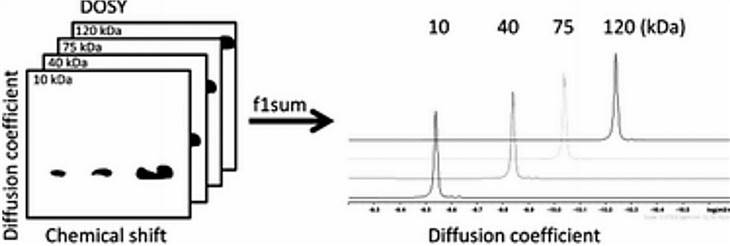Diffusion Coefficients of Polymers
The diffusion coefficient is a measure of the mobility of substances (atoms, molecules, or ions), which depends on the frequency and size of each movement of substances. Any nucleus can be monitored in DOSY with sensitivity as a limiting factor. Common atomic nuclei include 1H, 19F, and 31P.
As an expert in the field of nuclear magnetic resonance, Creative Biostructure can rely on DOSY NMR technology to provide customers with polymer diffusion coefficient analysis services, and to mine useful information from the obtained spectra. In addition, we optimized several parameters of the DOSY experiment to obtain effective, consistent and comparable results.
 Figure 1. DOSY NMR and diffusion coefficient. (Groves, 2017)
Figure 1. DOSY NMR and diffusion coefficient. (Groves, 2017)
Technical Principles
Because the diffusion coefficient is related to the hydrodynamic radius of molecules, DOSY is complementary to other physical methods used to measure the size/shape of molecules in polymer analysis. DOSY has been used to measure the average size of polymers.
Copolymers can be easily evaluated by DOSY. Copolymer signals with different diffusion coefficients indicate the presence of monomer impurities or homopolymer mixtures.
In addition, there is a linear correlation between the logarithm of the diffusion coefficient (log D) and the molecular weight of the polymer (log Mw).
Analysis Content
Based on the diffusion coefficient of the complex, we can help customers obtain the following information
- Measure the average size of the polymer.
- Tracking the rate of polymerization.
- Analyze the assembly of reversible polymers.
- The critical micelle concentration and micelle size were measured.
- Analyze the polymer and study the micellization characteristics.
- Analyze the oligomeric state of the mixture of small molecules and biological molecules.
- Distinguish between homopolymer and copolymer.
- Assist in measuring molecular size/shape in polymer analysis.
- Measure the molecular weight of the polymer.
Technical Features
In order to obtain effective, consistent, and comparable results, we optimized several parameters of the DOSY experiment, include:
- Pulse sequence and type of DOSY experiment
- solvents (mixtures) related to viscosity
- Gradient range (in Gcm-1)
- Diffusion delay Δ
- Diffusion gradient pulse length δ
- The number of gradient steps in the F1 dimension and the type of gradient spacing used
- Fitting procedures (and software) for diffusion size
- The number of points used to display the diffusion coefficient in the F1 dimension of the 2D diagram
- The dynamic range of the displayed diffusion coefficient
- Estimation error from multiple samples/experiments
Creative Biostructure is committed to providing high-quality NMR analysis services to advance the life sciences fields. If you have any questions or needs, please contact us and our customer service staff will help you the first time.
Ordering Process
Reference
- Groves P. Diffusion ordered spectroscopy (DOSY) as applied to polymers. Polymer Chemistry. 2017, 8(44): 6700-6708.

